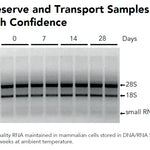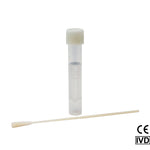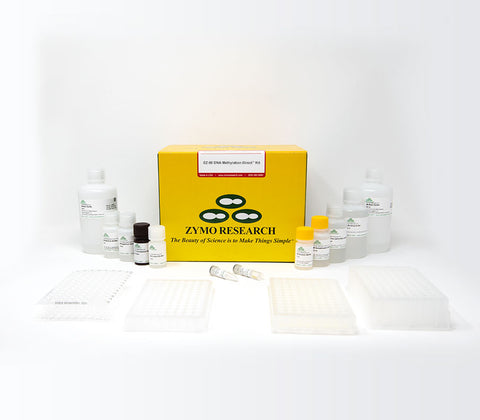Successfully Added to Cart
Customers also bought...
-
 DNA/RNA Shield (50 ml)Cat#: R1100-50DNA/RNA Shield reagent is a DNA and RNA stabilization solution for nucleic acids in any biological sample. This DNA and RNA stabilization solution preserves the...
DNA/RNA Shield (50 ml)Cat#: R1100-50DNA/RNA Shield reagent is a DNA and RNA stabilization solution for nucleic acids in any biological sample. This DNA and RNA stabilization solution preserves the... -
 DNA/RNA Shield SafeCollect Swab Collection Kit (1 ml fill) (1 collection kit)Cat#: R1160The DNA/RNA Shield SafeCollect Swab Collection Kit is a user-friendly collection kit for stabilizing the nucleic acid content of samples collected with a swab. DNA/RNA...
DNA/RNA Shield SafeCollect Swab Collection Kit (1 ml fill) (1 collection kit)Cat#: R1160The DNA/RNA Shield SafeCollect Swab Collection Kit is a user-friendly collection kit for stabilizing the nucleic acid content of samples collected with a swab. DNA/RNA...
Highlights
- High-throughput 96-well bisulfite conversion of DNA directly from blood, soft tissue, cells, FFPE samples, and LCM samples.
- Compatible with small sample inputs as few as 10 cells or 50 pg DNA.
- DNA recovered by this bisulfite conversion kit is ideal for downstream analyses including PCR, endonuclease digestion, sequencing, microarrays, etc.
Original Manufacturer
Satisfaction 100% guaranteed, read Our Promise
Innovated in California, Made in the USA
Highlights
- High-throughput 96-well bisulfite conversion of DNA directly from blood, soft tissue, cells, FFPE samples, and LCM samples.
- Compatible with small sample inputs as few as 10 cells or 50 pg DNA.
- DNA recovered by this bisulfite conversion kit is ideal for downstream analyses including PCR, endonuclease digestion, sequencing, microarrays, etc.
Original Manufacturer
Satisfaction 100% guaranteed, read Our Promise
Innovated in California, Made in the USA
| Cat # | Name | Size | Price | Quantity |
|---|
| Cat # | Name | Size | Price | |
|---|---|---|---|---|
| D5021-9 | M-Digestion Buffer (2X) | 15 ml | $19.10 | |
| D5021-8 | M-Reaction Buffer | 4ml | $26.80 | |
| D5021-7 | M-Solubilization Buffer | 18 ml | $35.60 | |
| D5006-3 | M-Binding Buffer | 125 ml | $73.90 | |
| D5007-6 | M-Elution Buffer | 8 ml | $12.80 | |
| D5006-2 | M-Dilution Buffer-Gold | 7 ml | $12.80 | |
| D5003-1 | CT Conversion Reagent (96 Conversions) | 1 Bottle | $80.20 | |
| D5002-5 | M-Desulphonation Buffer | 40 ml | $53.50 | |
| D5007-4 | M-Wash Buffer | 36 ml | $47.10 | |
| C2003 | Elution Plate | 2 Plates | $22.10 | |
| C2002 | Collection Plate | 2 Plates | $25.60 | |
| C2005 | Conversion Plate w/ Cover Foil | 2 Plates/Foils | $10.60 | |
| C2004 | Zymo-Spin I-96 Plate | 2 Plates | $165.70 | |
| C2001 | Silicon-A Plate | 2 Plates | $150.60 | |
Description
Performance
Technical Specifications
| Applications | Purified, converted DNA is of high-quality and well-suited for downstream processes, including library preparation for Next-generation sequencing, PCR amplification, etc. |
|---|---|
| Conversion | > 99.5% |
| Elution Volume | Shallow well: > 30 µl Deep-well: >15 µl |
| Equipment | Thermocycler with heated lid, swinging-bucket centrifuge with plate carriers. |
| Input | Samples containing between 50 pg to 2 µg of DNA. For optimal results, the amount of input DNA should be from 200 to 500 ng. The number of cells per standard treatment can range from 10-105 cells. |
| Processing Time | 4 hours |
| Recovery | > 80% |
| Sample Source | Blood, tissue, cells, FFPE, LCM-derived samples, purified genomic DNA, endonuclease-digested DNA, linearized plasmid DNA, etc. |
Resources
Documents
FAQ
http://www.zymoresearch.com/bisulfite-beginner-guide https://www.zymoresearch.com/bisulfite-primer-seeker
Leaving the desulphonation buffer on the column longer than recommended will cause more degradation and subsequently result in lower yields.
Bisulfite conversion will work regardless of context, so the kits are compatible with genomic DNA derived from plants and other species with high non-CpG methylation levels.
ZymoTaq DNA Polymerase has been specifically designed for use in bisulfite amplification reactions. ZymoTaq is available as a stand-alone polymerase (E2001/E2002), PreMix (E2003/E2004), and qPCR PreMix (E2054/E2055).
> 50 bp.
For best results, keep the method of quantification consistent before and after bisulfite treatment:
- If quantifying with a NanoDrop, use dsDNA settings (50 μg/ml for Ab260 = 1.0) before treatment and use RNA settings (40 μg/ml for Ab260 = 1.0) after treatment.
- If quantifying with Qubit, use a dsDNA assay before treatment and use a ssDNA assay after treatment.
Following bisulfite treatment, DNA will be single stranded with limited non-specific base pairing at room temperature. To visualize, run the converted DNA on an agarose gel then chill the gel on ice or in an ice bath for 30 minutes. This will force enough base-pairing to allow intercalation of the ethidium bromide for the DNA to be visible. If using a Bioanalyzer or TapeStation instrument, use RNA kits and reagents to visualize the converted DNA.
Poor conversion efficiency and low yields can be due to a variety of different experiment-specific conditions. Please contact Technical Support to discuss your specific experimental conditions and further troubleshoot with a product specialist.
Converted DNA eluted in M-Elution Buffer can generally be stored at -20°C for 1-3 months. If longer term storage is necessary, we recommend storing at or below -70°C if possible. Bisulfite converted DNA is less stable than dsDNA; for best results, minimize freeze-thawing of converted DNA and use as soon as possible for downstream analysis.
Product Video


Citations
Need help? Contact Us




